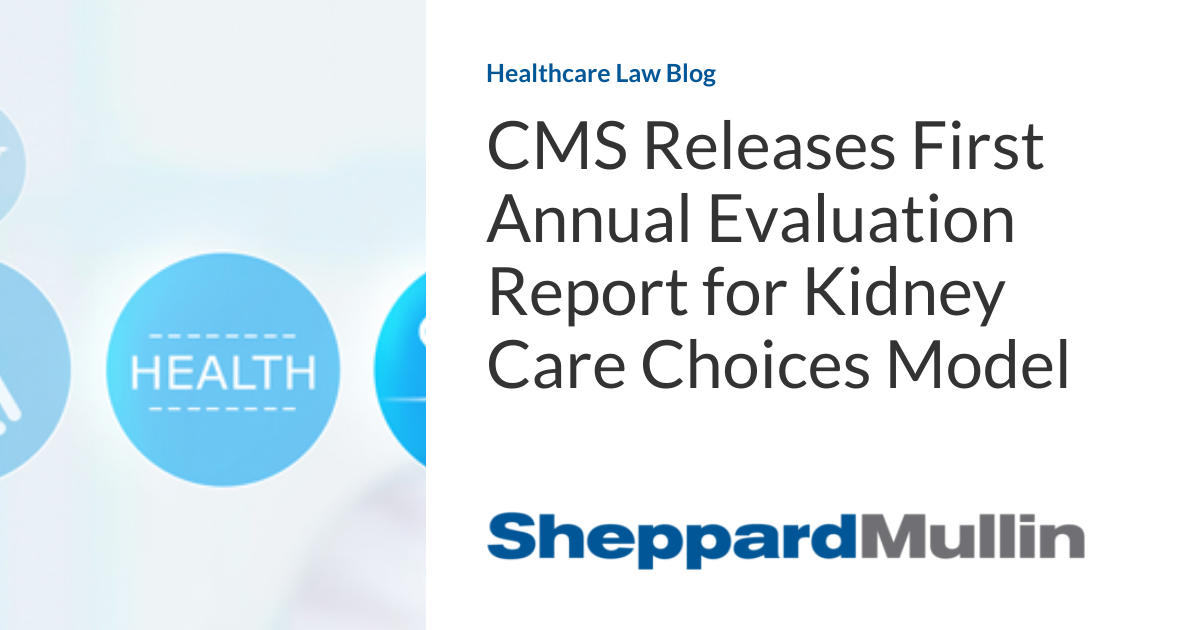Health insurance
Medicare Advantage: A Circuit Court Addresses What is (or is not) Material in False Claims Act Cases
[ad_1]
Friday the 13th is not all bad luck. On September 13, 2024, the United States Court of Appeals for the Eighth Circuit’s published its much-anticipated decision in United States ex rel. Holt v. Medicare Medicaid Advisors, affirming the Western District of Missouri’s dismissal of a Medicare Advantage case — a win for managed care stakeholders, especially insurance carriers, insurance brokers, and insurance marketing organizations. This case demonstrates that not all regulatory violations lead to False Claims Act (FCA) liability.
As background, in Medicare Advantage, insurance carriers are permitted to contract with licensed and appointed brokerages to sell Medicare Advantage plans. The insurance carriers pay the brokerage a contracted rate — based on the Centers for Medicare & Medicaid Services’ (CMS) maximum approved commission limits — for each enrollment application the brokerage sends to the carrier. The carrier, in turn, is paid by CMS for each beneficiary enrolled. It is the carrier’s responsibility to ensure that any contracted broker follows any regulations, such as requirements for certification or marketing prohibitions.[1]
In this case, the Relator (the individual plaintiff filing the action under theFCA), a former insurance agent, alleged that Medicare Medicaid Advisors, Inc. (MMA), an insurance brokerage, and several insurance carriers violated the FCA. Relator alleged three marketing violation schemes:
- MMA violated Medicare Advantage marketing regulations by engaging in unlawful business practices;[2]
- MMA falsified agent certification;[3] and
- MMA engaged in a “star-rating” scheme to avoid beneficiaries complaining directly to the carriers or CMS (which allegedly lowered the number of complaints CMS received about the carriers, resulting in a higher star rating).
The 8th Circuit held against Relator and for the carrier and brokerage defendants. The Circuit Court found that the alleged regulatory marketing violations were not material to CMS’s contracts with the carriers. The Court also found, with minimal discussion, that (i) the complaint failed to meet Federal Rule of Civil Procedure 9(b)’s particularity standard, (ii) no claims were submitted to the government, and (iii) denied Relator’s motion for reconsideration — thereby dismissing the case once and for all.
None of the Three Alleged Violations were Material to a Government Payment Decision
This case puts the Supreme Court’s ruling in Universal Health Servs., Inc. v. United States ex rel. Escobar, 579 U.S. 176 (2016) front and center. Under Escobar, Relators are required to prove that minor, technical, or potentially even major regulatory violations are material to the Government’s payment decision to sustain their case. In determining whether the violations were material to the Government’s payment decision, the 8th Circuit adopted the three non-exhaustive factors found in the 3rd and 6th Circuits:
- Whether the government has expressly designated the legal requirement at issue as a condition of payment (“condition of payment factor”);
- Whether the alleged violation is minor or insubstantial or instead goes to the essence of the bargain between the contractor and the government (“essence of the bargain factor”); and
- Whether the government made continued payments, or does so in the mine run of cases, despite actual knowledge of the violation.
For all three allegations, the Circuit Court held the third factor as “neutral,” as the Relator was unable to present examples of government action after discovering the alleged violations. Additionally, the Circuit Court found the “essence” of the contract between CMS and the carriers is to provide health care services to those who qualify, and therefore assessed the second factor under that backdrop.
Alleged Marketing Scheme
The Circuit Court found there was no condition of payment requiring either the carrier or their agent to follow Medicare marketing regulations in order to receive payment. As such, the condition of payment factor went against materiality for the alleged marketing scheme.
Related to the second factor, the Court also found that MMA’s failure to follow marketing regulations does not go to the “essence” of CMS’s contract with the carriers. The Court noted that the relevant regulations do not direct CMS to sanction a carrier because the carrier’s agent commits marketing violations; instead, CMS has discretionary authority to sanction carriers based on a “substantial” violation of the requirements. See 42 C.F.R. § 422.510(a)(4)(vii) (stating that CMS can terminate its contract with a carrier if the carrier “[s]ubstantially fails to comply with the [marketing and oversight] requirements” (emphasis added)).
The combination of CMS’s discretionary authority and use of the qualifier “substantial” in the regulations were both indications to the Circuit Court that these regulations do not go to the essence of the carriers’ contracts with CMS — i.e., the marketing scheme did not go to the essence of the carriers’ agreement to provide health care services to those who qualify.
As two of the three factors weighed in favor against materiality, the Circuit Court held that MMA’s alleged violations of marketing regulations were not material to CMS’s agreement with the carriers.
Alleged False Certification Scheme
As for the false certification allegations, the Circuit Court did not affirmatively decide how to weigh the condition of payment factor. Instead, the Court acknowledged that there are two ways to consider the factor: is CMS’s payment to a carrier conditioned on a rule requiring that a carrier’s broker use certified agents or is there a regulation that prevents the carrier form using the money it received from CMS to pay a broker who uses an uncertified agent (e.g., is the condition of payment based on the direct or indirect recipient of government funds) and assumed the condition of payment factor favored materiality.
However, as to the essence of the bargain factor, the Circuit Court quickly determined the regulations require the carrier to withhold payment to a broker who uses uncertified agents, while CMS still pays the carrier despite its reliance on uncertified agents. See 42 C.F.R. § 422.2274(d)(1)(i).
With one factor in favor, one factor in against, and one factor neutral, the Circuit Court concluded that the agent-certification scheme was immaterial under the FCA.
Alleged Star-Rating Scheme
In the shortest section of the opinion, the Court found the alleged star-rating scheme immaterial to CMS’s payment decision as well because (1) the court was unaware of any regulation conditioning CMS’s payment to carriers based on the carrier’s compliance with star-rating regulations and (2) the star-rating system does not go to the essence to contract with a carrier to provide health care services to those who qualify.
Why This Case Matters?
This case provides a roadmap for how to analyze materiality in Medicare Advantage cases. Because the government has not stopped, and apparently will not stop, paying carriers for providing health care benefits in the face of minor, insignificant, and unsubstantial violations of Medicare Advantage regulations, such violations cannot serve as a basis for FCA liability. That does not mean that these violations simply go unpunished; instead, CMS has ample enforcement powers to sanction carriers, such as suspending future plan enrollment; suspending payment for beneficiaries who are enrolled after notice; suspending communications; and imposing monetary penalties. See generally 42 C.F.R. § 422.750(a). But because CMS has these tools, and can choose when and how to use them, Relators must do more than simply point to a regulatory violation to meet the materiality standard under the FCA and Escobar.
We are closely watching the developing case law in this area to see how courts square the practicalities of Medicare Advantage with the elements of the FCA. We will update clients and friends on these developments at Health Care Law Today.
We are also closely watching the cases in the Northern District of Texas described in the footnote above that will affect agent-broker compensation, and our Health Care Practice Group is awaiting the U.S. Department of Health and Human Services’ Office of Inspector General’s (OIG’s) Industry Segment-Specific Compliance Program Guidance for Medicare Advantage which OIG has stated should be released in 2024.
Want to learn more about Medicare Advantage, Managed Care Litigation, and the FCA?
- FCA Managed Care Case Update: A Court’s View of ICD Guidelines in Risk Adjustment Cases
- Managed Care & the FCA: Are Courts Getting It Right?
- “Let’s Talk Compliance”: Medicare Advantage: Compliance Issues and Enforcement
- CMS Changes Medicare Advantage and Part D Plans’ Agent/Broker/TPMO Compensation Landscape
Foley is here to help you address the short- and long-term impacts in the wake of change. We have the resources to help you navigate these and other important legal considerations related to business operations and industry-specific issues. Please reach out to the authors, your Foley relationship partner, or to our Government Enforcement Defense and Investigations Group or Health Care Practice Group with any questions.
[1] Recent changes to the CMS regulations in the April 2024 final rule regarding agent-broker compensation are on hold pending decisions in the U.S. District Court for the Northern District of Texas. See Americans for Beneficiary Choice v. HHS, No. 4:24-cv-00439 and Council for Medicare Choice v. HHS, No. 4:24-cv-00446. Specifically, on July 3, 2024, the court issued preliminary injunctions which stay for the duration of the litigation the effective date of changes to §§ 422.2274(a), (c), (d) and (e) and 423.2274(a), (c), (d) and (e). See 89 Fed. Reg. 30,448 (Apr. 23, 2024). Additional information can be found in the July 18, 2024 memorandum from the Medicare Drug and Health Plan Contract Administration Group regarding Contract Year 2025 Agent and Broker Compensation Rates, Submissions, and Training and Testing Requirements, available at https://www.cms.gov/about-cms/information-systems/hpms/hpms-memos-archive-weekly/hpms-memos-wk-3-july-15-19.
[2] The alleged unlawful business practices included the following: (1) cold-calling and door-to-door sales of Medicare Advantage plans; (2) using false lead sheets to prompt or justify a sales call; (3) making misrepresentations to beneficiaries; (4) using the White Pages mobile application to find Medicare-aged individuals in the same area of other leads; (5) “churning,” or encouraging beneficiaries to switch plans to generate commissions; (6) “pushing” beneficiaries to Medicare Advantage plans preferred by MMA; (7) enrolling beneficiaries outside of the Annual Enrollment Period; and (8) enrolling individuals in the federally subsidized Extra Help program without checking that enrollees met the income limits.
[3] Allegedly, MMA falsely attested that its agents were fully certified to sell Medicare Advantage plans when MMA knew its agents were not.
The post Medicare Advantage: A Circuit Court Addresses What is (or is not) Material in False Claims Act Cases appeared first on Foley & Lardner LLP.
[ad_2]
#Medicare #Advantage #Circuit #Court #Addresses #Material #False #Claims #Act #Cases
Source link











